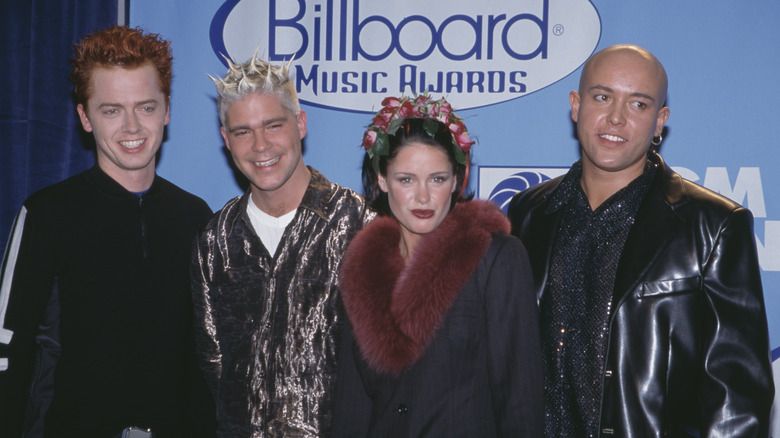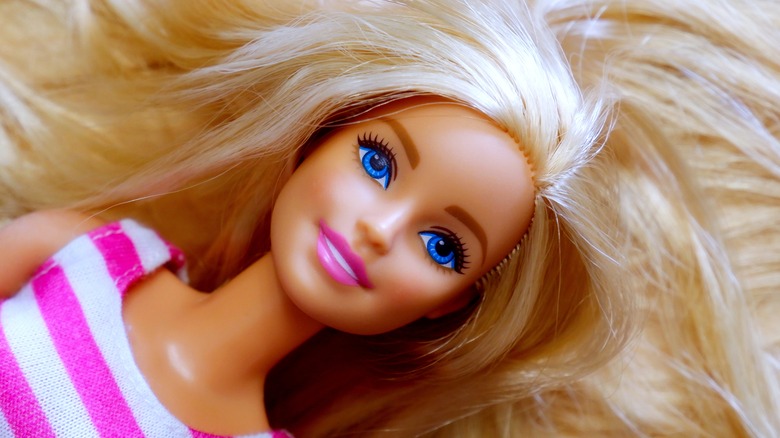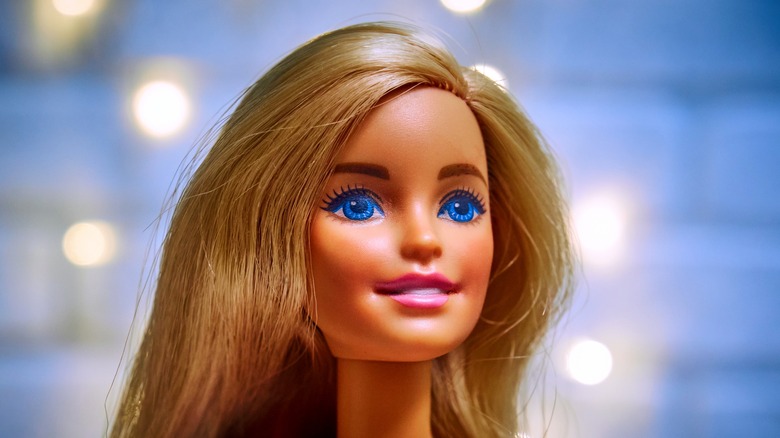The Real Inspiration Behind Aqua's Barbie Girl Song
Whether you feel it's an insufferable earworm or a timeless bop, one thing's for certain: Aqua's 1997 song "Barbie Girl" is one of the bestselling pop singles of all time. On the surface, what the international chart-topping song is about seems obvious: Those beloved titans of the toy industry, Barbie dolls. That reference to Barbie even got Aqua in trouble in the early 2000s with Mattel, Barbie's copyright holders, uDiscoverMusic reports.
As Aqua keyboardist Søren Rasted revealed to Rolling Stone in 2022, though, the song is inspired by Barbie dolls — specifically, an art installation he saw while writing Aqua's first album. "I went to an art exhibition at a store in Copenhagen," he told the outlet. "They'd taken a bunch of Barbie dolls and made a planet out of them. It looked like a big, round ball." The experience led to the idea of the line, "Life in plastic, it's fantastic," and then, "Come on, Barbie, let's go party."
The song's meaning
The meaning behind the song might not be what you think. It's not an ode to being tall, blonde, and beautiful — unrealistic body ideals the Barbie doll line is sometimes criticized for promoting. Instead, as Aqua singer René Dif told Rolling Stone, "The message is that it's okay to be the person you are and look the way you look and be confident in that. You don't necessarily have to have plastic surgeries to be a better person."
In the lyrics of the song, there's some sexual content, but Dif insists it's all tongue-n-cheek. "It's a pop song, but it's also a song about how it's OK to be who you are, love who you are, and be yourself," he told Rolling Stone. Aqua's Lene Nystrøm, the song's other singer, added, "We wanted to take the piss out of that kind of perfect girl. That was the main thing we discussed. We didn't say it very often, but that was the main thing behind it."
According to Søren Rasted, though, the initial intention was entertainment. "We were not really trying to make a statement," he told Rolling Stone. "We were just trying to write a fun song."
The music video
The music video for Aqua's "Barbie Girl" is probably almost as iconic as the song and likely remembered by anyone who knows the smash hit. During the 2022 Rolling Stone interview, director Peder Pedersen revealed how he got the offer for the job a day after hearing the song on the radio for the first time. The video's use of color is not unlike the 2023 "Barbie" movie — something Pedersen called a "cartoonish ... kind of feel," which he likened to the feel of the song.
"That's also what the group had in mind," he said. "We had a session where we went, 'What does Barbie do? What kind of props does she have? Well, she has a house, a car, a horse, a hair dryer, a telephone, a dog ...' Then I went back and did a complete storyboard for it. And we had a timeline saying, 'Barbie does a lot of things, and it ends in a party.'"
Though the video was storyboarded, Aqua and the actors who played Ken and Barbie improvised parts. Mads Tagel, who played Ken, said they didn't rehearse. "And we didn't know each other," he added. "So everything you see in the video, the smiles, the waving — I think we were trying to imitate a doll-like movement — is improvised. And because of the setting, the whole thing had this weird vibe that Lisbeth and I just leaned into — just trying to have fun, because an hour before we were lying on the couch watching a movie."
As for inspiration, Pedersen looked to "The Flintstones," "Scooby Doo," and — perhaps surprisingly — Spike Jonze's video for Beastie Boys' "Sabotage."
Mattel filed a lawsuit over Barbie Girl in the year 2000
A smash success, Mattel — Barbie dolls' parent company — filed a lawsuit against Aqua's label MCA over copyright infringement. MCA counter-sued Mattel for defamation, per Billboard. (As a band, Aqua was not named in either suit.) In 2002, the case was settled when a Delaware appeals court ruled in MCA's favor. In their 2022 Rolling Stone oral history of the song, MCA's lawyer Russell Frackman said, "Mattel had a weak case."
Frackman said, "It also became very clear that Barbie had been represented in books and other media, even in recordings prior to 'Barbie Girl,' as representing a certain type of person. She became an icon standing for a certain type of person. That led to the major defenses in the case, which were essentially First Amendment defenses." Referring to the lawsuit, Aqua singer Lene Nystrøm added, "There were a lot of hassles around it, bit it was also hilarious. And it was a free commercial on both sides, for Mattel and for us."


